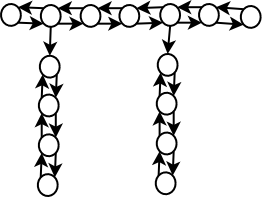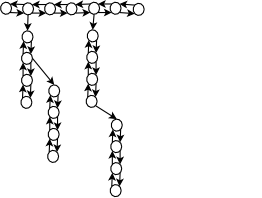Algorithmathon Day 7: Double Linked List Flattening
Created: 19 July 2013 Modified:Today’s goal is to flatten a list of lists into one long list. This means in addition to having a prev_node and next_node attribute the element will also have a child attribute which may or may not point to another list. An Illustration of this is below.

We will be using the Double Linked List (DoLL) base code from Day 6. Follow this link for Algorithmathon Rules. The Source Code is also available. Adding the child attribute to the element would be a good first step. We should write a test and the code to satisfy it as shown below.
double_linked_list_element_spec.rb (excerpt)
require 'spec_helper'
# code omitted here
it "should have a 'child' method" do
DoubleLinkedListElement.method_defined?(:child).should be_true
end
# code omitted heredouble_linked_list_element.rb
require 'spec_helper'
class DoubleLinkedListElement
attr_accessor :next_node, :prev_node, :child, :data
def initialize(data=nil,next_node=nil,prev_node=nil,child=nil)
self.data=data
self.next_node=next_node
self.prev_node=prev_node
self.child=child
end
endIn order to adequately test that the list flattening is working as desired we need a list that isn’t flat. Since we will need this list in multiple tests the best way to handle this is to use helper methods. Building such a list could be error prone and we should build a test to verify our list is constructed correctly.
double_linked_list_spec.rb (excerpt)
# code omitted here
it "should build a non flat list correctly" do
list = build_master_list()
list.length().should == 12
list.element_at(0).child.length().should == 6
list.element_at(4).child.length().should == 8
list.element_at(11).child.length().should == 16
end
# code omitted hereWith the failing test written we can now write our helpers to construct our list.
spec_helper.rb
$LOAD_PATH.unshift File.expand_path('lib')
require 'double_linked_list'
require 'double_linked_list_element'
def add_elements(the_list)
the_list.add(DoubleLinkedListElement.new("one"))
the_list.add(DoubleLinkedListElement.new("two"))
the_list.add(DoubleLinkedListElement.new("three"))
the_list.add(DoubleLinkedListElement.new("four"))
end
def build_list(number_list)
the_list=DoubleLinkedList.new()
number_list.each { | the_number |
the_list.add(DoubleLinkedListElement.new(the_number.to_s))
}
the_list
end
def build_master_list()
the_list=build_list((1..12))
the_list.element_at(0).child=build_list(13..18)
the_list.element_at(4).child=build_list(19..26)
the_list.element_at(11).child=build_list(27..42)
the_list
endThe uneven list builder constructed we should move onto writing tests which give our expectations of the flatten! method.
double_linked_list_spec.rb (excerpt)
# code omitted here
it "should have a length of 42 when it receives the 'flatten!' message" do
list = build_master_list()
list.flatten!()
list.length().should == 42
end
it "should return '13' when it receives the message 'element_at(12).data'" do
list = build_master_list()
list.flatten!()
list.element_at(1).data.should == '13'
end
it "should return '18' when it receives the message 'element_at(6).data'" do
list = build_master_list()
list.flatten!()
list.element_at(6).data.should == '18'
end
it "should return '2' when it receives the message 'element_at(7).data'" do
list = build_master_list()
list.flatten!()
list.element_at(7).data.should == '2'
end
# code omitted hereThe tests are all passing. It’s Miller time! Kicking back with my BBC Bourbon Barrel Stout, I discuss what we have done so far. You of course are welcome to drink the beverage of your choice:) Suddenly, we realize we haven’t accounted for a child who also has a child! This means we will need to go back and update our tests and the helper methods. Methods which are capable of handling a structure similar to the one illustrated below.

double_linked_list_spec.rb (excerpt)
# code omitted here
it "should build a non flat list correctly" do
list = build_master_list()
list.length().should == 12
list.element_at(0).child.length().should == 6
list.element_at(0).child.last().child.length().should == 8
list.element_at(4).child.length().should == 8
list.element_at(4).child.element_at(2).child.length().should == 8
list.element_at(11).child.length().should == 3
list.element_at(11).child.element_at(0).child.length().should == 6
end
# code omitted herespec_helper.rb (excerpt)
# code omitted here
def build_master_list()
the_list=build_list((1..12))
first_child_list=build_list(13..18)
second_child_list=build_list(19..26)
first_child_list.last().child=second_child_list
the_list.element_at(0).child=first_child_list
first_child_list=build_list(27..34)
second_child_list=build_list(35..42)
first_child_list.element_at(2).child=second_child_list
the_list.element_at(4).child=first_child_list
first_child_list=build_list(43..45)
second_child_list=build_list(46..51)
first_child_list.element_at(0).child=second_child_list
the_list.element_at(11).child=first_child_list
the_list
end
# code omitted hereWe now have a list that has children which in turn also have children. Unfortunately tests that are already written are now failing and new tests need to be written. Being RSpecofiles (™ pending) we hop right into some tests.
double_linked_list_spec.rb (excerpt)
# code omitted here
it "should have a length of 51 when it receives the 'flatten!' message" do
list = build_master_list()
list.flatten!()
list.length().should == 51
end
it "should return '13' when it receives the message 'element_at(12).data'" do
list = build_master_list()
list.flatten!()
list.element_at(1).data.should == '13'
end
it "should return '18' when it receives the message 'element_at(6).data'" do
list = build_master_list()
list.flatten!()
list.element_at(6).data.should == '18'
end
it "should return '19' when it receives the message 'element_at(7).data'" do
list = build_master_list()
list.flatten!()
list.element_at(7).data.should == '19'
end
it "should return '5' when it receives the message 'element_at(18).data'" do
list = build_master_list()
list.flatten!()
list.element_at(18).data.should == '5'
end
it "should return '27' when it receives the message 'element_at(19).data'" do
list = build_master_list()
list.flatten!()
list.element_at(19).data.should == '27'
end
it "should return '51' when it receives the message 'element_at(48).data'" do
list = build_master_list()
list.flatten!()
list.element_at(48).data.should == '51'
end
it "should return '45' when it receives the message 'element_at(50).data'" do
list = build_master_list()
list.flatten!()
list.element_at(50).data.should == '45'
end
# code omitted hereSeveral tests are failing and we need to update the code in our DoLL by rewriting the flatten_by_recursion method.
double_linked_list.rb (excerpt)
# code omitted here
def flatten_by_recursion(element)
unless element.nil?
if element.child.nil?
flatten_by_recursion(element.next_node)
else
relink(element)
flatten_by_recursion(element.next_node)
end
end
end
def relink(element)
tail = element.child.last()
head = element.child.element_at(0)
next_node = element.next_node
element.next_node=head
tail.next_node=next_node
@length = @length + element.child.length()
end
# code omitted hereAll our tests are passing and this looks like a good place to stop. Tomorrow we will look into adding an unflatten! method.
tags: Algorithm - Algorithmathon - Double Linked List - RSpec - Ruby